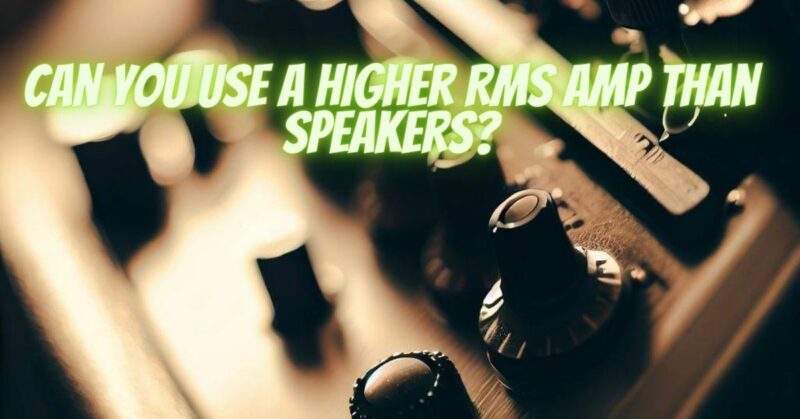Matching amplifiers to speakers is a fundamental aspect of building an audio system that delivers the desired sound quality and performance. When selecting amplifiers and speakers, you may wonder if it’s acceptable to use a higher RMS (Root Mean Square) amplifier than the speakers’ RMS ratings. In this article, we will explore the implications and considerations of using a higher RMS amp with speakers, and whether this approach is advisable.
Understanding RMS Power Ratings
RMS power ratings, expressed in watts (W), are crucial specifications provided by manufacturers for both amplifiers and speakers. They represent the amount of continuous electrical power a component can handle without risk of damage or performance degradation. Matching the RMS power ratings of amplifiers and speakers helps ensure optimal sound quality and longevity.
Using a Higher RMS Amp: Implications and Considerations
While using a higher RMS amp with speakers is possible, it involves several implications and considerations:
- Volume Control: A higher RMS amplifier can provide more power to the speakers, potentially allowing for greater volume levels. However, it is essential to exercise caution when increasing the volume to avoid overpowering the speakers, which can lead to damage.
- Risk of Damage: The primary concern when using a higher RMS amp is the risk of damaging the speakers. If the amplifier consistently delivers more power than the speakers’ RMS rating, it can lead to overheating, voice coil damage, and other issues. While most speakers can handle brief peaks of power exceeding their RMS rating, prolonged exposure to excessive power can be detrimental.
- Clipping and Distortion: High-power amplifiers used with speakers with lower RMS ratings can lead to clipping and distortion. When the amplifier tries to push more power than the speakers can handle, it results in clipped audio signals, producing harsh and unpleasant sound. This distortion can damage speakers over time.
- Loss of Speaker Control: A mismatch between amplifier power and speaker capability can result in a loss of control over the speakers. This loss of control can manifest as imprecise and less accurate sound reproduction.
- Reduced Dynamic Range: Using a higher RMS amp may affect the dynamic range of the audio. The dynamic range is the difference between the softest and loudest sounds in a recording. An overly powerful amplifier can compress this range, leading to a loss of nuance and subtlety in the audio.
- Budget Considerations: Higher RMS amplifiers often come with a higher price tag. If your speakers don’t require the additional power, investing in a lower-powered amplifier that matches your speakers’ RMS ratings may be a more cost-effective choice.
- Speaker Quality: The quality of your speakers plays a significant role. High-quality speakers are designed to handle power efficiently and may be more tolerant of slightly higher RMS amplifiers. Conversely, lower-quality speakers may not handle the additional power as effectively.
Using a higher RMS amplifier than your speakers’ RMS ratings can provide greater volume potential, but it comes with potential risks and considerations. To make an informed decision, carefully evaluate your audio system’s components, including the quality of your speakers, your listening environment, and your budget. If you choose to use a higher RMS amp, exercise caution when adjusting the volume to avoid damaging your speakers. Matching amplifiers and speakers within their RMS ratings is generally recommended to ensure optimal sound quality and equipment longevity.


